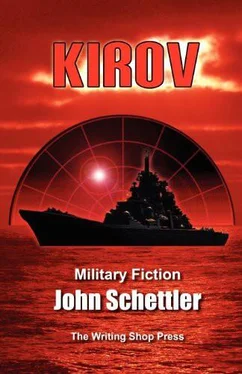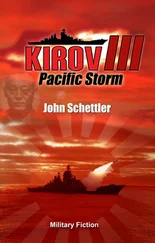John Schettler - Kirov
Здесь есть возможность читать онлайн «John Schettler - Kirov» весь текст электронной книги совершенно бесплатно (целиком полную версию без сокращений). В некоторых случаях можно слушать аудио, скачать через торрент в формате fb2 и присутствует краткое содержание. Жанр: Фантастика и фэнтези, Альтернативная история, на английском языке. Описание произведения, (предисловие) а так же отзывы посетителей доступны на портале библиотеки ЛибКат.
- Название:Kirov
- Автор:
- Жанр:
- Год:неизвестен
- ISBN:нет данных
- Рейтинг книги:5 / 5. Голосов: 1
-
Избранное:Добавить в избранное
- Отзывы:
-
Ваша оценка:
- 100
- 1
- 2
- 3
- 4
- 5
Kirov: краткое содержание, описание и аннотация
Предлагаем к чтению аннотацию, описание, краткое содержание или предисловие (зависит от того, что написал сам автор книги «Kirov»). Если вы не нашли необходимую информацию о книге — напишите в комментариях, мы постараемся отыскать её.
Kirov — читать онлайн бесплатно полную книгу (весь текст) целиком
Ниже представлен текст книги, разбитый по страницам. Система сохранения места последней прочитанной страницы, позволяет с удобством читать онлайн бесплатно книгу «Kirov», без необходимости каждый раз заново искать на чём Вы остановились. Поставьте закладку, и сможете в любой момент перейти на страницу, на которой закончили чтение.
Интервал:
Закладка:
Where lies would not serve, Karpov often feigned friendship by sending unusual gifts at odd hours and in unusual circumstances. Once, he had sent a bottle of fine French champagne to a rival officer on the day after his son had failed miserably in his crucial academy testing. He rubbed it in by pretending to apologize the next day, saying he was so certain the young many would pass that he believed the gift was well made. “Perhaps next semester,” he concluded. His message in these petty and often offensive capers was obvious, and they were one of many reasons why those beneath Karpov in the ranks had come to dislike him so much. For those above him, he reserved liberal praise and the most strict and proper decorum-until he set his mind on the post that particular officer occupied. After that, when a man became an obstacle, Karpov began a long and calculated campaign to subtly undermine him, a whisper here, a rumor there, a little vranyo, a little more lozh, an arranged embarrassing moment in the line of duty that would serve to cast doubt on his rival’s competency.
Once, in an exercise much like the one Kirov had planned for that very day, he had gone so far as to tamper with the towing line clamps for the target barges that would be towed by a rival captain. Then he insisted on a high speed maneuver that he knew would tax the compromised link until it gave way, leaving the barges scattered and adrift, and well out of proper position when the live fire exercise was scheduled to begin. His report on the matter was particularly critical of his rival, and he went so far as to joke about “Kutusov’s folly” in the ranks, cementing the mishap securely in the lore of the navy at the time.
When he received word that he had been made Kirov’s new Captain, he swelled with pride-until Volsky arrived. Now he saw the Admiral as an obstacle to his free reign here; someone he had to defer to out of respect to the man’s rank, though he often thought he knew better when it came to the machinations of running the ship.
The Captain always waited for the Admiral’s seat to cool before he finally settled into it to stand his command watch on the bridge. The residual warmth always made him uncomfortable, a reminder that there was someone else above him in rank on the ship; someone he had to answer to, that the ship was not truly his.
“Come about, Mr. Orlov,” he said to his Chief of Operations. “Port thirty.” Yet even as he gave the order he heard, or rather felt a distant heavy rumble, ominous and deep, like a great kettle drum being struck by a mighty hammer.
“What in god's name was that?” said the Captain. “That was no thunder.” There came a blinding white light, and Karpov saw his navigator, Fedorov, pulling off his headset, instinctively shielding his eyes. The searing light flashed and vanished, leaving the air alive with what looked like a hundred thousand fireflies all around the ship, strange luminescent particles that spun on the cold airs, whirling and dancing as they slowly faded to milky green. When it passed he instinctively looked out of the forward viewing panes, surprised to see that the ocean itself seemed to light up for miles in every direction with a strange phosphorescent color. Then the sea erupted in the distance, boiling up in a wild convulsion of sound and motion. The ship shuddered with the impact of a strong blast wave, rolling heavily.
Karpov gripped the side arms of his chair to steady himself, and everyone on the bridge braced for further impact, one man thrown from his seat near the helm, his eyes wide with fear and astonishment. The strident welter of sound subsided, resolving to an eerie sharp cellophane crackle that hung in the air like a wave of heavy static electricity. Then there came a low descending vroom, the sound falling through three octaves as if it had been sucked into a black hole and devoured.
Stunned and amazed, every member of the bridge crew seemed frozen, their faces twisted into expressions of numbed, painful shock. Then Karpov’s high, sharp voice broke the silence as he barked out in order.
“Action stations! We are under attack!”
Chapter 3
Admiral Volsky was halfway to his cabin when the ship lurched with the sudden motion, lights in the gangway winking and dimming. He heard the strange descending sound as he braced himself against the bulkhead, eyes wide with surprise, yet something deep within chided him, telling him he should have been more alert. The vague disquiet that had befuddled him earlier was now a jangling surge of adrenaline. An instant later every nerve in his body seemed to tingle with warning, as if a thousand needles had pierced his flesh. The feeling passed quickly, however, and he steadied himself, turning about at once and heading back toward the command bridge as fast as his heavy legs would carry him.
As he approached the citadel he saw the look on the guard’s face there by the hatch, registering shock and anxiety. But the instant the man saw the Admiral, he seemed to straighten with newfound resolve, saluting crisply, an expression of relief brightening in his eyes.
Volsky nodded to the man as he passed through the hatch and into the citadel where he could hear Karpov shouting at the helmsman to put on speed. Thirty years at sea told him the ship was already in a sharp turn, as if maneuvering to avoid the track of an oncoming missile or torpedo.
“What is happening?” he shouted, his deep voice loud and commanding.
“Admiral on the bridge!” Chief Orlov's voice cut through the bedlam and all eyes turned to the graying command officer, waiting. The Admiral knew that he must appear decisive, in control, no matter how bewildered he himself was at the moment. He tugged sharply on the lower hem of his jacket, adjusting the tilt of his cap as he strode to the center of the bridge. Karpov slipped out of his chair, saluting to acknowledge the Admiral's presence, and reported.
“An explosion of some kind, sir. Massive!”
“Aboard ship?”
“No, sir. It seemed to be an undersea detonation, of considerable size. Look at the ocean! I believe we may be under attack, and I have ordered the ship to take high-speed evasive maneuvers.”
At action stations the primary overhead lighting was dimmed and the bridge was wreathed in shadow, bathed with red emergency lighting and alight with the glow of many screens and consoles. Volsky looked out through the forward view panes, astonished to see the luminescent radiance of the sea all around them, as if some deep underwater energy source was emanating from the ocean floor. The flat panel digital screen mounted high on one wall to his left also showed the same scene, though the image was checkered with interference, the blocks of digital information disassembling and reassembling as the system worked to tune and display a clear signal and image. He immediately turned to Grigori Rodenko, his chief radar man.
“Rodenko?” It was clear that he wanted an immediate report from his CIC, the Combat Information Center, positioned on the right quarter of the citadel. There sat his three gods of war, Rodenko on radar and sensors, Tasarov on Anti-Submarine Warfare, and Samsonov on Combat Systems. They were already hard at work, leaning forward to note readings on their screens, and making adjustments to fine tune the data they were receiving. Rodenko turned to the admiral, a bemused look on his face.
“Nothing, sir. I read no contacts of any kind. But there is heavy interference.”
“Jamming signatures?”
“No sir. Too chaotic. Too widespread. It’s spread out over the entire bandwidth. We may have just experienced a severe EMP burst. System integrity appears normal but I'm initiating diagnostics to confirm.”
“EMP burst?” said Karpov sharply. “Initiate immediate NBC protocols!” Chief Orlov immediately repeated his order, a crewman stiffly palming a control toggle and sending a shrill alarm throughout the ship to rig for defense against potential nuclear, biological, or chemical attack. Already at action stations for the exercise, the crew would now take additional measures, screening all ports, securing all hatches, donning protective gear in the event of an attack by exotic weaponry.
Читать дальшеИнтервал:
Закладка:
Похожие книги на «Kirov»
Представляем Вашему вниманию похожие книги на «Kirov» списком для выбора. Мы отобрали схожую по названию и смыслу литературу в надежде предоставить читателям больше вариантов отыскать новые, интересные, ещё непрочитанные произведения.
Обсуждение, отзывы о книге «Kirov» и просто собственные мнения читателей. Оставьте ваши комментарии, напишите, что Вы думаете о произведении, его смысле или главных героях. Укажите что конкретно понравилось, а что нет, и почему Вы так считаете.












